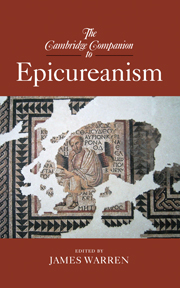Book contents
- Frontmatter
- Introduction
- 1 The Athenian Garden
- 2 Epicureanism in the Roman Republic
- 3 Epicureanism in the Roman Empire
- 4 Epicurean atomism
- 5 Epicurean empiricism
- 6 Cosmology and meteorology
- 7 Psychology
- 8 Action and responsibility
- 9 Pleasure and desire
- 10 Politics and society
- 11 Epicurean philosophy of language
- 12 Philosophia and technē: Epicureans on the arts
- 13 Removing fear
- 14 Epicurean therapeutic strategies
- 15 Epicureanism in early modern philosophy
- Bibliography
- Index
14 - Epicurean therapeutic strategies
Published online by Cambridge University Press: 28 September 2009
- Frontmatter
- Introduction
- 1 The Athenian Garden
- 2 Epicureanism in the Roman Republic
- 3 Epicureanism in the Roman Empire
- 4 Epicurean atomism
- 5 Epicurean empiricism
- 6 Cosmology and meteorology
- 7 Psychology
- 8 Action and responsibility
- 9 Pleasure and desire
- 10 Politics and society
- 11 Epicurean philosophy of language
- 12 Philosophia and technē: Epicureans on the arts
- 13 Removing fear
- 14 Epicurean therapeutic strategies
- 15 Epicureanism in early modern philosophy
- Bibliography
- Index
Summary
Like other Hellenistic philosophers, the Epicureans assume that the principal goal of philosophy is to secure one's happiness, and that that result can be achieved only by removing the principal causes of human suffering, namely the vices (kakiai) and certain emotions or passions (pathē). Considered in the light of a normative conception of nature and psychic health, these are diseases of the soul that philosophy must cure and thus restore the soul to its healthy natural state, much as medicine treats the ailments of the body aiming to restore its unimpeded functioning. Therapy consists in purging from the soul the elements of moral disease, in putting into the soul the right elements, and often in both. However, from the practical perspective, the important aspect of the therapy is purgatory: the removal of features that cause disturbance and unhappiness rather than the replenishment of whatever knowledge we lack. Epicurus is the first member of the school to compare philosophy to medicine and the philosopher to the medical doctor (221 Us.). Lucretius (first century BC), Philodemus (first century BC), Diogenes of Oinoanda (second century AD) and other Epicureans are also wedded to the so-called medical analogy. They too perceive the philosopher as a kind of doctor who cures disturbance and anxiety and helps us achieve the supreme good, pleasure (hōdonō) or the absence of pain (aponia). The medical model suggests that philosophical therapy is an ongoing activity integrated into the context of ethical praxis.
- Type
- Chapter
- Information
- The Cambridge Companion to Epicureanism , pp. 249 - 265Publisher: Cambridge University PressPrint publication year: 2009
- 41
- Cited by

